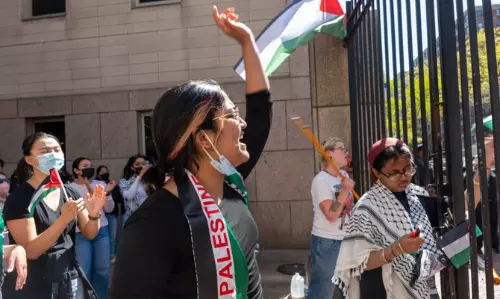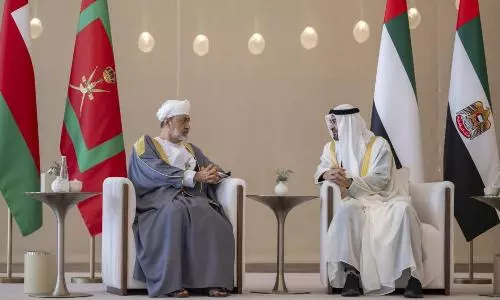
Toll in Kenya university attack rises to 147
text_fieldsNairobi: At least 17 people were killed and over 60 injured by armed assailants who forced their way into a university in northeastern Kenya and opened fire at students early Thursday even as authorities said 280 students were rescued while 535 still remained unaccounted for.
The authorities said the toll could rise further after the militants stormed the university near the border with Somalia, taking students hostage and battling security forces for several hours, Xinhua news agency reported.
Police and soldiers surrounded and sealed off the campus, and were attempting to flush out the gunmen, according to Inspector General of Police Joseph Boinett.
The Al Shabaab terror group, which has links to the Al Qaeda network, has claimed responsibility for the 5.30 a.m. raid, saying it was holding many Christian hostages inside.
"We have killed many people and Kenyans will be shocked when they get inside," they said in their radio station.
Interior Cabinet Secretary Joseph Nkaissery told journalists in Garissa that one suspect was arrested while trying to flee the scene, and is being interrogated in connection with the attack at Moi University campus in Garissa.
"The institution has 815 students and 60 members of staff. The security agents have managed to account for 280 students and all the members of staff," he told journalists in Garissa.
The attack started at dawn from the mosque inside the campus where the attackers shot at worshippers indiscriminately.
Students who escaped the gunfire said there were at least five attackers.
Boinnet earlier said there was a shootout between the attackers and the police officers who were guarding the students' hostels.
"The attackers shot indiscriminately while inside the university compound."
"However, the attackers retreated and gained entry into the hostel... a joint force composed of National Police Service Commission (NPS) officers and other security agencies arrived and are engaged in an elaborative process of flushing out the gunmen from the hostels," he said in a statement posted on his Twitter account.
Kenya Defence Force (KDF) and police entered the university's compound.
Local security officials said there had been threats on the institutions there from terror groups.
"We had the threats earlier and had alerted the institutions here," a security official said.
Meanwhile, Kenyan police on Thursday circulated a photo of a senior Al Shabaab leader, whom they believe is behind the attack.
The police placed a $54,350 bounty on the head of Mohamed Kuno, who is Al Shabaab's military commander in Lower Juba region in southern Somalia. He is currently in charge of external operations against Kenya.
"He (Kuno) commands the militia along the border and is responsible for cross-border incursions in the country. In the recent past, he has intensified attacks in Northern Kenya and Coast region, particularly in Garissa, Mandera, Lamu," the police said.
Sources said the suspect was aided by two local youths to conduct surveillance on the Moi University Garissa campus.
According to police, Kuno is believed to be very religious and has been a Madrassa teacher for several years. He worked for Al-Haramain Foundation between 1993 and 1995 before the institution was closed. At that time he was known as Sheikh Mahamad.
The suspect later became a teacher and principal at Madarasa Najah in Garissa from 1997 to 2000, where his extremist tendencies became more manifested. He thereafter joined Al Shabaab after being motivated by the ideology of Islamic Courts Union (ICU) to establish an Islamic statehood in Somalia.
It is reported that the majority of the terror attacks in Garissa were carried out by former students of Madarasa Najah. Most of the recruits were drawn from close family members and clan mates.
Police said Kuno used the ideals of caliphate governance to persuade and recruit his students to join the ICU and later to join Al Shabaab.
The militant group had established a unit in every region of Somalia, and Kuno was charged with carrying out attacks against foreign troops.
He is also credited with having an extensive terrorist network within Kenya, particularly at the Dadaab refugee camp. Kuno claimed responsibility for last year's bus attack in Mandera in which 28 people were killed.























